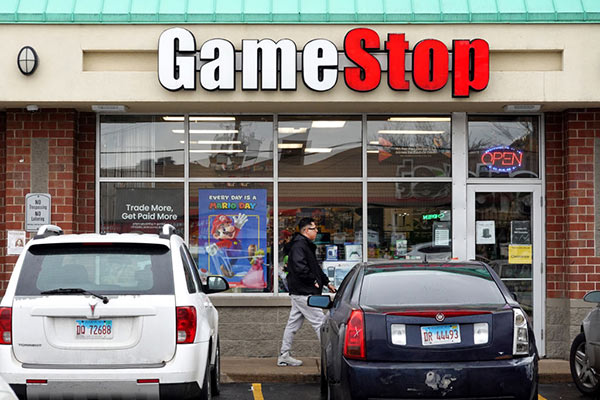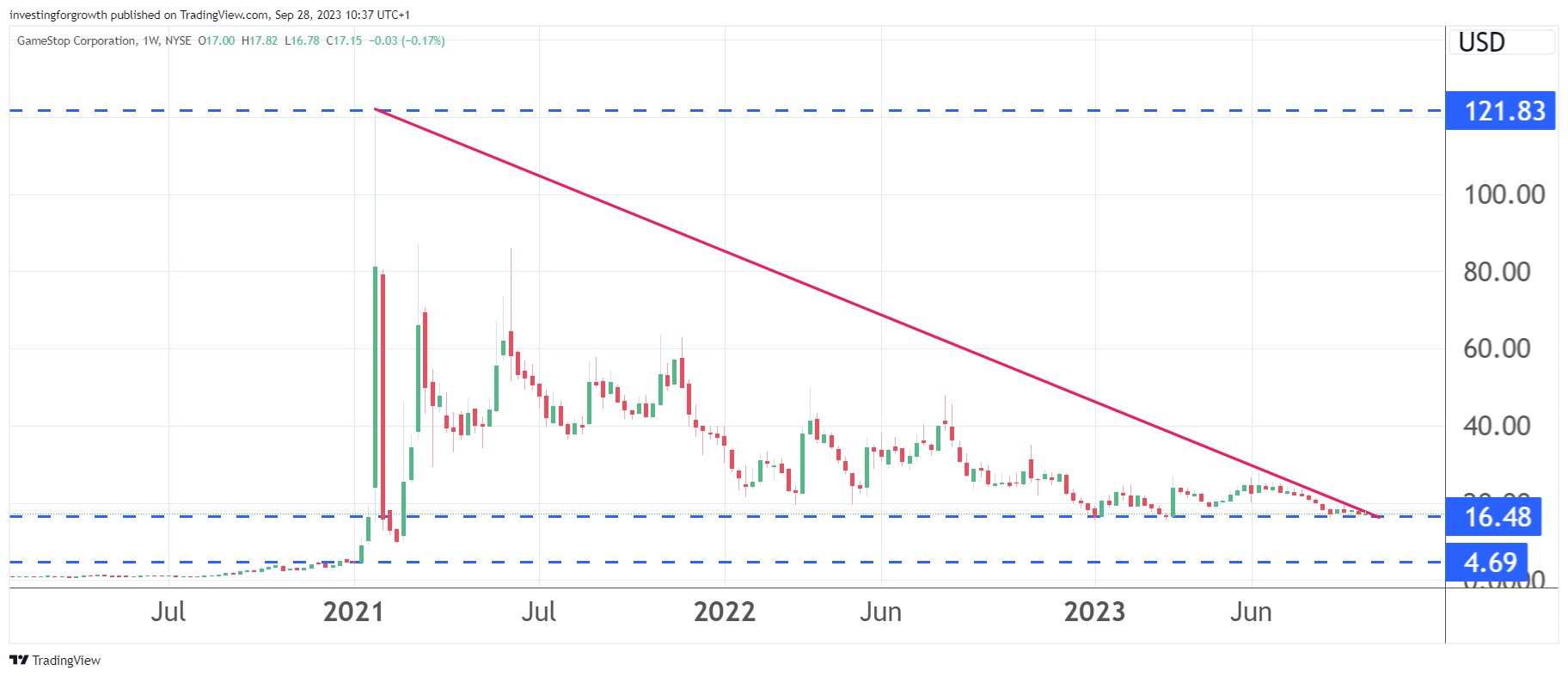Dumb Money: when investors get caught out by bubbles
These shares surged over 2,500% in just a few weeks, but it didn’t end well for everyone. After watching the film ‘Dumb Money’ based on events of January 2021, Nina Kelly explains why there are lessons for all private investors in the GameStop saga.
28th September 2023 12:51
by Nina Kelly from interactive investor

Caption: Keith Gill, aka Roaring Kitty, on a fragment of a YouTube video. Credit: Pavlo Gonchar/SOPA Images/LightRocket via Getty Images.
Warning: this article contains spoilers.
“Dumb Money”, for anyone unfamiliar with the term, is the label supposedly given by Wall Street to you and me, i.e., retail investors. Flattering, isn’t it.
The recently released film of the same name is an account of the GameStop (NYSE:GME) bubble, which blew up in January 2021, while the world was in the grip of the Covid-19 pandemic.
- Invest with ii: Buy US Stocks from UK | Most-traded US Stocks | Cashback Offers
Dumb Money, which isbased on the book The Antisocial Network, successfully transports us back to that sweaty-face-mask-wearing period with the help of hip-hop tunes and shots of empty streets and nasal swabbing, while shining a light on inequalities in American society, contrasting hedge fund managers in mega-mansions with laid-off retail staff working as delivery drivers to make ends meet.
As lockdown ennui in the winter of 2021 threatened to crush us all, and workers lucky enough to hold on to their jobs built up substantial savings, investor focus, like the eye of Sauron, turned to small-cap US video-game retailer GameStop. Operating out of bricks-and-mortar stores across America, a GameStop outlet wouldn’t have looked out of place in the strip-mall housing Saul Goodman’s office in TV crime drama Breaking Bad.
So, given that there was no significant update on the company’s outlook, how did so-called Dumb Money transform a stock, which had been valued at less than $18 at the beginning of January 2021, into one worth as much as $483 before the month was out - a profit of 2,580%?* And what can all Dumb Money investors learn from this episode?
Game on: the origins of the short squeeze
Shortly before GameStop shares soared, the company brought in new directors in the hope of turning the business around. A real-life analyst Keith Gill (played by Paul Dano in the film), whose moniker on YouTuber was “Roaring Kitty”, had a sizeable position in GameStop. A self-described nerd, Roaring Kitty wears a cat t-shirt and a red bandanna for his basement-broadcasted videos. He argues from the outset that GameStop is undervalued and that he “just likes the stock”. In the film Gill is no villain and he’s portrayed as a passionate private investor who shares details of his own investments with his followers.
In the realm of Reddit, an online discussion forum, average Joes start to go up against Wall Street, which, as one character in Dumb Money explains, “is betting that GameStop is gonna fail, and if it fails these hedge-fund douchebags make a ton of money”.
- How Nasdaq-100 ‘special rebalance’ has impacted the big seven tech stocks
- Seven pension tips I learned as a financial adviser
Hedge funds shorting GameStop shares (betting that the shares would fall) were caught in what’s called a “short squeeze” (when investors who sold short rush to buy back the shares when demand returns), triggered by explosive demand from retail investors which threatened to send the price of the stock “to the Moon”.
During GameStop’s ascent, the actor playing Gabe Plotkin, of now defunct real-life hedge fund Melvin Capital, is answering his wife’s question about how much money they lost that day. Plotkin can barely meet her eye as he admits “$1billion”. When she asks what the figure was for the day before, he again mutters “$1billion”. One of the film’s characters observes that Dumb Money investors have “got rich people pissing their pants”.

Who bought GameStop shares?
In Dumb Money, we meet several American investors – some of whom are based on real-life investors. They are a young-ish bunch, including a hospital nurse on the front line, a GameStop shop worker, and two college students. All have backstories which make you feel sympathetic towards them. But will so-called Dumb Money also be smart money?
This side of the pond, it was a similar story in terms of age, with younger people buying into GameStop, according to customer data from interactive investor. As we reported at the time, “GameStop was the most-bought equity in 2021 among customers in the 18-24 and 25-34 age categories – but the popularity of the stock waned with age.”
But, and this is the crux, our data shows that younger investors at interactive investor tended to have balanced portfolios, with a focus on investment trusts and other collectives. In other words, they were diversified, and didn’t have their life savings in a single stock. Given their youth, they may have been diehard video game fans, partly explaining GameStop’s appeal.
Did Dumb Money investors play it smart?
Social media’s role
Several investors in the film are portrayed as emotionally “invested” – for want of a better word – in Roaring Kitty. Their loyalty to him and determination to stay invested for as long as he holds the stock is concerning, and it’s a cautionary tale for anyone.
Roaring Kitty was a social media “finfluencer” and, as an analyst, possessed more knowledge and experience than many of his followers. He also put disclaimers on his videos. Rather than mimicking another person’s investing decisions or tips, it’s vital to rely on your own research, or at least build up enough financial knowledge to be able to objectively analyse someone else’s.
Two of interactive investor’s respected columnists, Ian Cowie and Richard Beddard, disclose details of their portfolios, but neither advocate copying their positions wholesale. My colleague Sam Benstead wrote recently about the risks involved in being a copycat investor.
Buy, buy, buy. Sell, sell sell!
One of the most painful stories in the film involves a nurse, whose husband has left her and their two kids. She’s a single mother paying the mortgage alone, and you learn that she’s also in debt. You can’t help thinking how it might have been better to try to clear expensive debt before ploughing money into a volatile share like GameStop, but she wants in and uses a “free trading” app that the film skewers, each buy generating a congratulatory confetti explosion: dopamine hit delivered.
At one point, she could have sold and made a life-changing sum, allowing her to pay off the mortgage, and other debts, but she holds out, seemingly in a gesture of solidarity.
Yet who can call the top of the market? Even professional investors struggle to get it right. If you are Dumb Money, i.e., an ordinary investor, it’s prudent to have goals for your investments, and understand which circumstances could trigger a sale for you and allow you to take any profits.

Emotions in the mix
A lot of investor behaviour in the film is driven by emotion, whether it’s trading fuelled by an “Us vs Them” anger and a desire to “stick it to the Man”, or buying driven by the excitement of watching a stock shoot up. The Odeon cinema where I saw Dumb Money screened a short trailer from the Financial Conduct Authority, warning viewers of the dangers of investment hype. Other cinema chains are reportedly also taking part.
It’s vital to keep emotion out of investing, and the regular, monthly drip-feeding of money into investments you have carefully chosen, for example, is often something that can help you keep a cool head, and calm an itchy trigger figure.
Game over
In the film, you watch characters gamble precarious financial security on GameStop, with seemingly no portfolio diversification. Our latest data visualisation, for example, illustrates why diversifying across different asset classes is so vital.
Naturally, there are winners in Dumb Money. Two indebted college students - thrillingly - both walk away from GameStop with six-figure sums, but was it anything other than dumb luck? Roaring Kitty was also a winner, and the film claims Keith Gill’s net worth is $34 million. It goes on to suggest that hedge funds now scour the internet for signs of what the “little people” are talking about online, and how Wall Street can never again ignore “Dumb Money”.
While GameStop is surely an example of the powerful impact retail investor activism can have, what did it really achieve apart from allowing some people to make a quick buck?
Since the spike in its share price in January 2021, the company’s stock has yet to retreat to the lows of its pre-Reddit frenzy, but it's also nowhere near the dizzy heights of two years ago.

Source: TradingView. Past performance is not a guide to future performance.
Richard Hunter, interactive investor’s head of markets, warned at the time of the GameStop saga, that: “The best way to get your voice heard against the establishment is to vote [in shareholder AGMs]. And that applies to either side of the Atlantic.”
Whether it’s blocking exorbitant pay or other issues, this is how investors can have a meaningful impact on the companies they own. ii customers receive notifications through their ii app “voting mailbox” service, informing them when they are eligible to place a vote. They will also be notified about important shareholder events, including AGMs.
*prices have changed since 2022 when GameStop announced a 4-for-1 share split, with shareholders receiving three new shares for each share held. The effect is to give shareholders more stock, but at a lower price to keep the value of their holdings the same.
These articles are provided for information purposes only. Occasionally, an opinion about whether to buy or sell a specific investment may be provided by third parties. The content is not intended to be a personal recommendation to buy or sell any financial instrument or product, or to adopt any investment strategy as it is not provided based on an assessment of your investing knowledge and experience, your financial situation or your investment objectives. The value of your investments, and the income derived from them, may go down as well as up. You may not get back all the money that you invest. The investments referred to in this article may not be suitable for all investors, and if in doubt, an investor should seek advice from a qualified investment adviser.
Full performance can be found on the company or index summary page on the interactive investor website. Simply click on the company's or index name highlighted in the article.